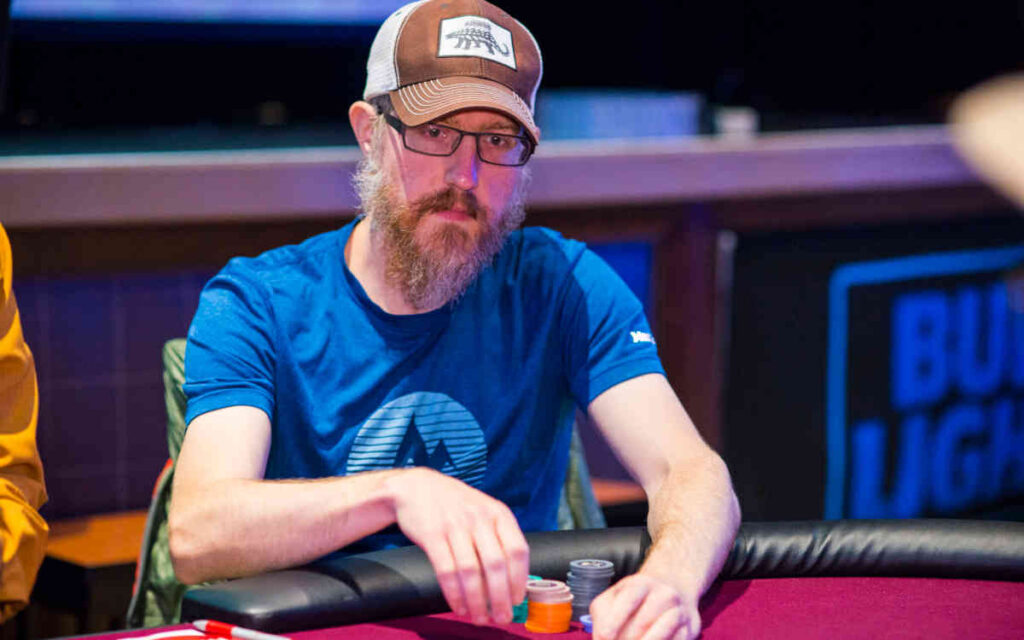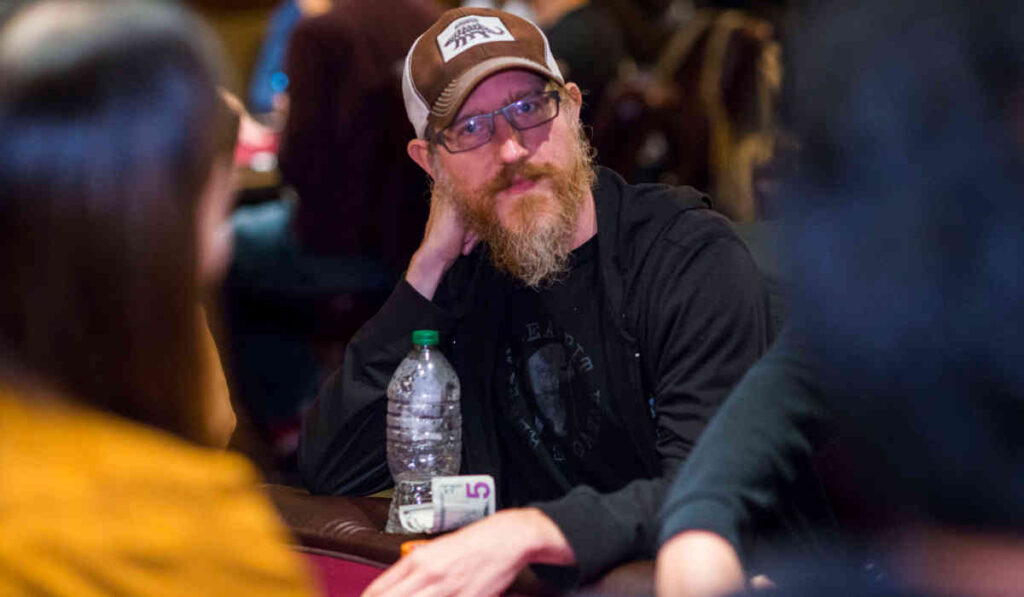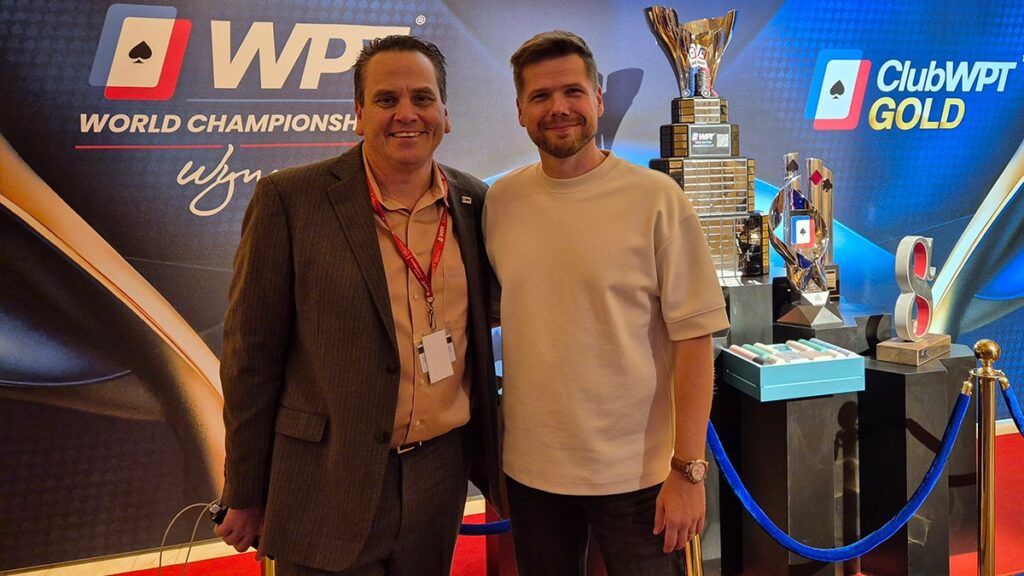Images courtesy of World Poker Tour
Thoughtful, articulate, and endlessly curious, Andrew Brokos represents the thinking player’s ideal: a strategist who not only plays the game at a high level, but who also elevates how others understand it.
In this edition of Inside the Poker Circles, drawn from Between the Blinds: Interviewing Poker Professionals by Sara O’Connor (coming this fall), we feature the longtime coach, author, and podcast host whose analytical approach has influenced a generation of poker minds.
As the voice behind the Thinking Poker podcast and a respected author and instructor, Brokos blends theory with practicality, helping players bridge the gap between knowledge and execution. At the tables, his measured, principled style reflects a commitment to precision and long-term growth.
In this interview, he shares the key lessons from his journey, the philosophy that shapes his decisions, and how he continues to evolve in a game that never stops changing. This is Inside the Poker Circles.
Do you remember your first time playing? If so, what was it like?
I definitely don’t remember my literal first time playing poker. What I do remember is that from a young age I was playing with my family using pennies. I also remember my first time playing in a public cardroom.
In 2005, I took my dad on Father’s Day to Atlantic City, New Jersey and we entered a $100 tournament. I had been playing online and making money. At this time, I had a decent understanding of poker, but I was very concerned. I was concerned that I’d be playing against very good players if they were in a casino in the middle of the day.
That fear wasn’t realized, because that turned out to not be the case! This was reassuring. I had a good time playing in that tournament to celebrate Father’s Day.
How do you not let past success affect your current play?
I would say I want my past success to affect my current play. Confidence is important, because you have to make plays that are not going to work a lot of times. You’re going to put money in the pot, and that’s not going to work half the time.
Like when you’re bluffing, it’s going to work half the time and miss half the time. That feeling of loss when you lose feels like you’re making a mistake, but it’s possible you’re doing the right move!
Having the confidence to say I know what I’m doing with my strategic foundation is so important. My track record gives me confidence that allows me to trust myself to make necessary decisions in the future.
What’s your least favorite thing about playing the game?
My least favorite thing about playing the game is probably the way that it sometimes encourages me to think about other people in a negative way. To play my best, I must be pretty cutthroat, and that’s not really the kind of person I want to be.
In some ways, poker is good for me. For example, when you’re buying a car, you want to have a cutthroat gear. Poker has helped me improve this. But it’s not a headspace I like being in. I don’t generally want this aspect of poker to carry into other aspects of my life.
Any favorite moments when playing?
I don’t know about favorite moments when playing, but one thing I like about poker is how accessible it is for different kinds of people. There are still barriers for people with disabilities, but I’ve played live poker with many disabled people, and I am fascinated by the adaptations that enable them to play.
I played with someone who was blind and someone who played with his toes! The gentleman who could play with his toes could cut a precise number of chips off his stack with his toes to place a bet. He had a little ramp to look at his cards. I find that stuff very interesting.
As a player, how, if at all, do you handle disputes at the table?

If it’s a dispute involving other people, I usually stay out of it. If someone needs to interfere, I’d prefer it to be the dealer or the floor. If I know someone involved, I might try to diffuse something. If the dispute is directed at me, I try to respond impassively.
I like making people feel ridiculous. If you’re ignoring them or giving short answers and people are getting feisty, it’s my hope to diffuse their anger and just make them feel ridiculous. I hope that makes them act less like that in the future.
Do you have any pre- or post-game rituals you practice?
Not really. There’s nothing that I’m dogmatic about doing before or after.
One thing I do that I think is important is if I end up in a spot where I’m unsure, even if I get exactly the outcome I wanted, I try to write down as many details about that spot then and there. That’s my commitment to myself to investigate that later, usually the next day.
The important thing is to get it out of my head, so I don’t ruminate about it while I’m still playing. I want to be focused on the poker hand I’m currently playing. Writing down spots for later study allows my brain to set it aside and focus on the job at hand.
What is the largest pot you remember winning or the most memorable win you’ve accomplished?
This is where we come back to the player who plays with his toes.
This happened in 2006. It was my first WSOP Main Event. I was already a professional-ish player, but I didn’t have a bankroll to play the Main Event. I set aside $1k for side events. I didn’t know enough to sell action.
At my Day 1 table, I was seated with a person who was in a motorcycle accident and had a wheelchair and who did pretty much everything with his feet. He had an assistant with him.
If he won a pot, the assistant would take the chips and stack them. He could do everything else for himself such as placing bets and looking at his cards.
He did well in the Main Event the previous year. There were cameras around right away to catch this guy at the table, so I knew that there was a chance I was on ESPN. That was added pressure.
I had already won some pots off this person and I could tell that he was getting increasingly flustered and frustrated with me. There was a point in the game where he made a pretty big bet on the river, and I was really confident he was bluffing.
All I had was king high, but I didn’t think he was bluffing with anything stronger, so I called and won.
These were the highest stakes I ever played and especially with it being during Day 1, it made me feel very good calling him with king-high and being right.
That I was willing to put my money behind my reads, even though I would have looked foolish had I gotten it wrong, required a confidence in myself that resulted in me feeling stronger.
Don’t call the river with king-high is a good rule, but it was important here to break it. He took it well, but he was frustrated. When asked how he’s doing by the reporters, he pointed at me with his toe and said, “Ask this guy how I’m doing.”
Do you do anything to help bring more women into the game? If so, what?

I try to use my podcast Thinking Poker for this purpose. My current co-host, who has been hosting the podcast with me for close to 3 years, and I made an intentional effort to bring more black women specifically to the show. I’m proud to say that we have been pretty successful in that regard.
We did find several black women to have on the show, and those episodes have been some of the best shows we’ve done! I think having the intention to put in the extra work to find them, resulted in our being able to get unique and interesting stories.
While it’s not as intrinsically important to me to have women poker players as much as it is to have them serving as judges and representatives in government, I do want women to feel comfortable at the poker table. Likewise, I want non-binary and other gender-nonconforming people to feel comfortable as well.
How did you celebrate one of your first or most memorable wins?
The very first big win I had was before I went pro and was when I was in college. I went to the University of Chicago in the vicinity of a high crime area. We had a fairly large tournament at the college dormitories. It was $10 to enter, and we’d play twice a week.
When I finally won it, it was the last time I played out of 30 or 40 times. I honestly don’t know if I’ve had a more satisfying win. It was the first time I won, and I had my $200 tucked in my sock in case I got robbed.
I figured the robbers could take my wallet, but they wouldn’t get that money! It was a good amount of money to me while walking through Chicago late at night; it was exhilarating.
What’s it like being a poker educator and co-founder of the Thinking Poker Podcast?
It’s great! I’ve always been interested in education. I’ve done some work in schools. I like poker in general, because it is such a zero-sum cutthroat game. I like that the coaching and the podcast creation space is more about helping people and being in a cooperative relationship rather than an “I’m trying to take yours and you’re trying to take mine” mentality.
The Thinking Poker Podcast is the thing that I’m most proud of at this point! The podcast was something I started doing 12 years ago with Nate Meyvis. He and I had been friendly through a poker forum. In 2011, we were both running deep in the Main Event.
It was Day 5, and we had been having dinner together each day. Frankly, because of the stress of those five days and running that deep, we really valued those dinners to decompress. I did one or two solo episodes of the podcast, and then he offered to do the podcast with me.
About a year after that, we had Carlos Welch on, and even though we had no idea he existed when we started the show, sometimes it feels like we started the show so that we would meet Carlos. He went on to become a regular guest on the show and a good friend. We’d hang out in Vegas together.
When Nate stepped aside because he stopped playing poker, I would have stopped doing the podcast. Carlos was the only other person I could imagine hosting the show with. Fortunately, he took over as the co-host. It’s great having an impetus to talk to my friend every week!


